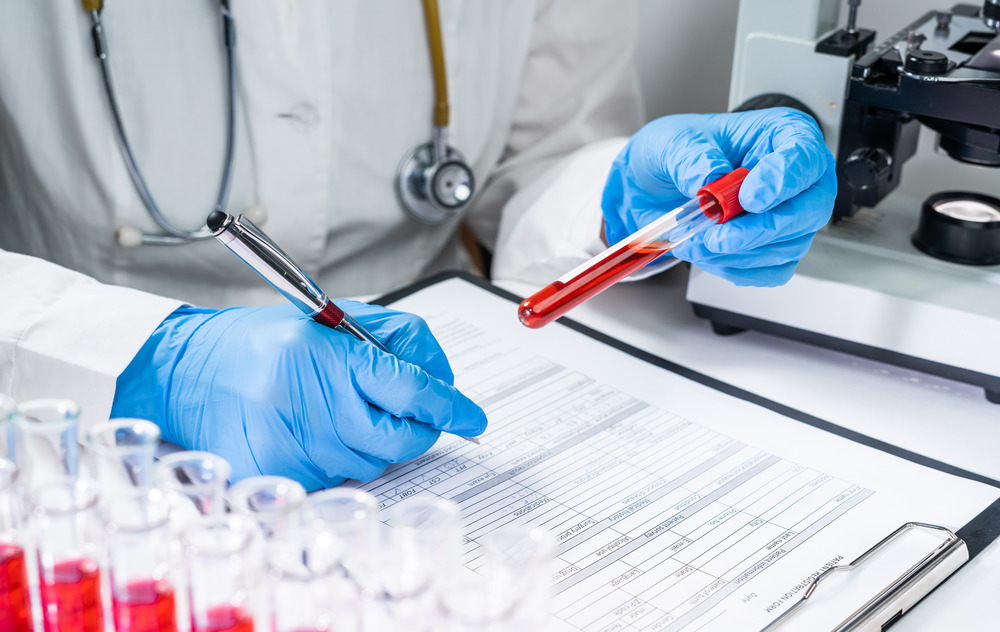The simple answer to this question is yes; provided the level of the protein or tumor marker used to detect primary liver cancer (or hepatocellular carcinoma) is above a specific threshold. This protein or tumor marker, called alpha-fetoprotein (AFP), although not completely specific to liver cancer is virtually diagnostic of hepatocellular carcinoma if present at levels above 400 ng/mL.
Recent studies have demonstrated that even at levels above 200 ng/mL, the chances of diagnosing hepatocellular carcinoma are quite high, with a sensitivity of 50% and specificity of 98%.
However, it is also true that many patients with hepatocellular carcinoma may never have abnormally elevated levels of AFP. Hence the importance of the cutoff value of 400 ng/mL for the AFP levels to establish a diagnosis of hepatocellular carcinoma. To optimize screening for hepatocellular carcinoma, both the American Association for the Study of Liver Disease (AASLD) and the European Association for the Study of the Liver (EASL) recommend using ultrasound every 6 months combined with AFP testing for patients who are at high risk of developing hepatocellular carcinoma.
Ultrasound
When the suspicion of liver cancer exists, ultrasound is often used as the first screening test. Ultrasounds are performed on an outpatient basis and use sound waves to create an image on a computer screen. If a mass is identified during a routine exam, the next step is to perform a more definitive imaging test usually in the form of a contrast-enhanced Computerized Tomography (CT) Scan or contrast-enhanced Magnetic Resonance Imaging (MRI).
Computerized Tomography (CT) Scans
A CT scan of the abdomen produces detailed x-ray images and can help detect many types of liver tumors. It can also reveal information about the size, shape, and location of tumors in the liver and abdomen, as well as the surrounding blood vessels. CT scans may also be used to guide a biopsy needle precisely into a suspicious tumor (called a CT-guided needle biopsy). If liver cancer is detected, a CT scan of the chest may also be performed to check whether cancer has spread to the lungs.
Computerized Tomography (CT) Scans
A CT scan of the abdomen produces detailed x-ray images and can help detect many types of liver tumors. It can also reveal information about the size, shape, and location of tumors in the liver and abdomen, as well as the surrounding blood vessels. CT scans may also be used to guide a biopsy needle precisely into a suspicious tumor (called a CT-guided needle biopsy). If liver cancer is detected, a CT scan of the chest may also be performed to check whether cancer has spread to the lungs.
Similarly, MRI scans produce detailed images of the body’s soft tissues. However, MRI scans use radio waves and powerful magnets instead of x-rays. When it comes to examining liver tumors, MRIs are extremely useful and can often distinguish between benign and malignant tumors. They can also be used to detect any blockages in the liver’s blood vessels and see whether liver cancer has spread to other parts of the body.
Angiography
An angiogram is a type of x-ray test that examines blood vessels. Before the test, a contrast dye is injected into an artery to outline the blood vessels while x-ray images are taken. Since angiography is used to visualize arteries that supply blood to a liver tumor, this can help doctors determine whether the tumor can be removed. It can also be used to guide some non-surgical liver cancer treatments, such as radioembolization.
An angiography begins with a small catheter that is placed into an artery to inject the dye. The catheter is inserted into an artery in your groin and advanced into the hepatic artery under direct visualization and in an extremely precise manner. Once in suitable position, the catheter is used as a conduit to deliver tiny radioactive beads to the tumor in order to kill it.
Non-Surgical Liver Cancer Treatments in New York
At USA Oncology Centers, our goal is to provide the most advanced liver cancer treatments in New York that maximize your chance of survival and improve your quality of life. No matter your situation, we will work to establish the best approach for treatment while considering your personal preferences and overall health requirements.
Our doctors are experts in providing non-surgical treatments for both primary and secondary liver cancer, including the following:
At USA Oncology Centers, our patients always come first. To learn more about our treatment options, call 855.870.4747 or schedule an appointment with an interventional oncologist today.

